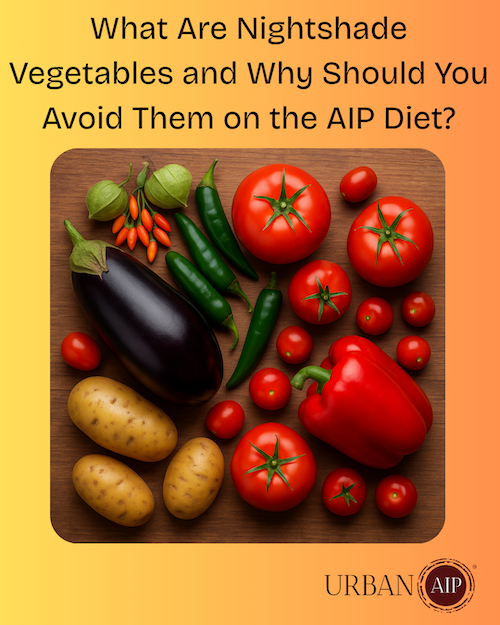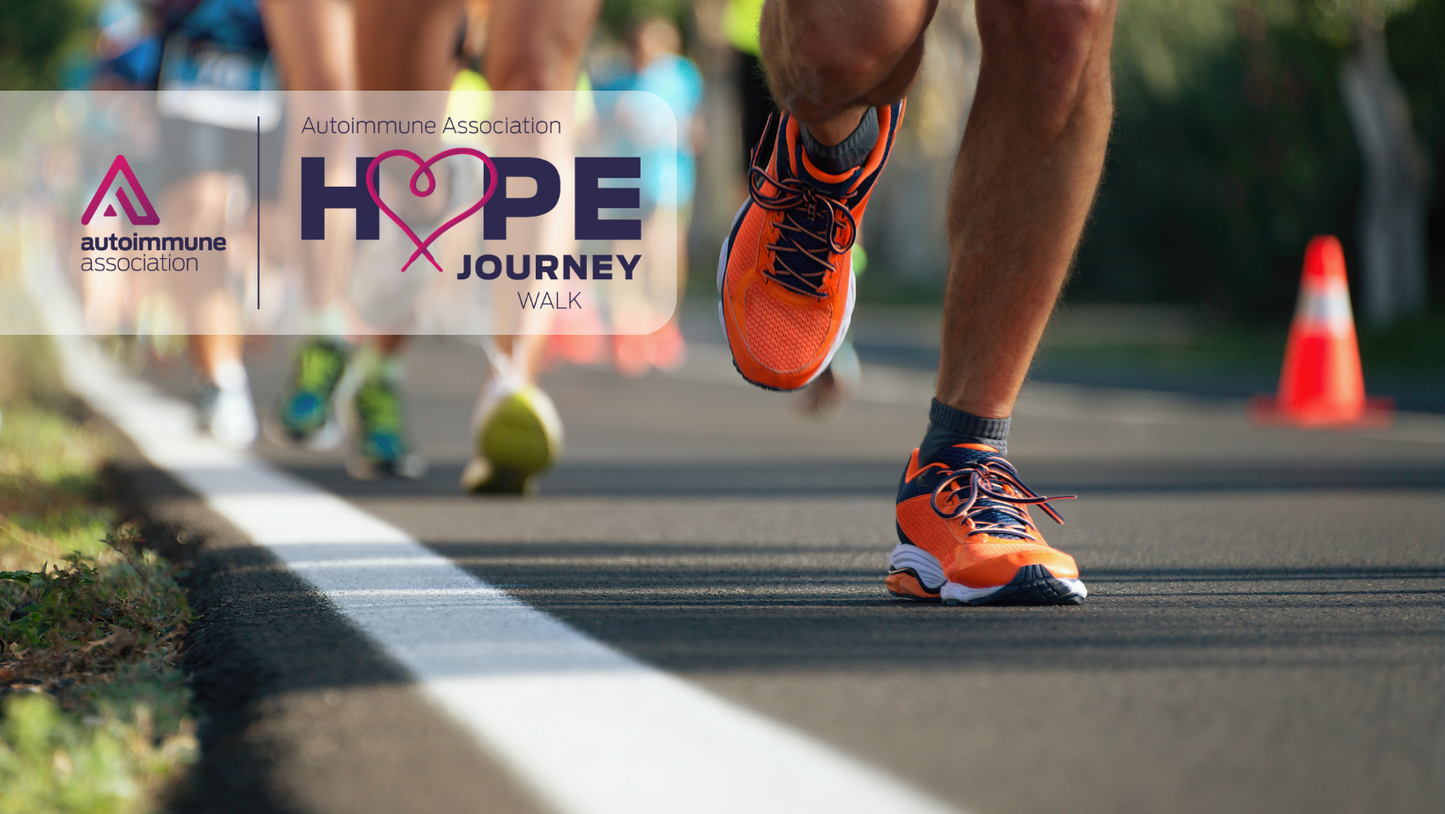
If you're exploring the Autoimmune Protocol (AIP) diet, you’ve likely noticed that nightshade vegetables are on the “foods to eliminate” list. But what exactly are nightshades, and why are they excluded from a protocol specifically designed to calm inflammation, repair the gut, and support autoimmune healing?
Let’s take a closer look.
What Are Nightshade Vegetables?
Nightshades are a group of plants in the Solanaceae family, many of which are common in everyday cooking. The most well-known include:
- Tomatoes
- White, red, and yellow potatoes (but not sweet potatoes)
- Peppers (bell peppers, chili peppers, jalapeños, cayenne, paprika)
- Eggplant
- Tomatillos
- Goji berries
-
Ashwagandha
What sets nightshades apart is their natural production of alkaloids — nitrogen-containing compounds that help the plant defend itself from pests and fungi. While harmless to most people in small amounts, these compounds may pose problems for individuals with autoimmune conditions or compromised gut integrity.
Why Are Nightshades Eliminated on the AIP Diet?
The AIP diet focuses on identifying and removing dietary triggers that may aggravate the immune system. Nightshades are eliminated during the elimination phase for several key reasons:
1. Alkaloids May Compromise Gut Barrier Function
Alkaloids like solanine, tomatine, and capsaicin can irritate the digestive lining and may contribute to increased intestinal permeability, often referred to as “leaky gut.” This condition is believed to contribute to autoimmune disease by allowing undigested food particles and toxins to enter the bloodstream and trigger immune responses.
Interestingly, the idea of enhancing gut permeability can be beneficial or harmful depending on the context. For example, black pepper is often paired with turmeric because it contains piperine, a compound that increases gut permeability just enough to enhance curcumin absorption. But for individuals with autoimmune conditions, this same mechanism, when triggered by alkaloids from nightshades, may backfire by increasing exposure to immune-reactive particles.
2. They May Stimulate the Immune System
Alkaloids can act as immune stimulants, increasing the activity of white blood cells and the production of inflammatory cytokines. While this may support immune defense in a healthy person, it can heighten symptoms in individuals with an already overactive immune system.
3. They Can Contribute to Joint and Muscle Pain
Many people with autoimmune arthritis report flares, increased stiffness, or joint swelling after consuming nightshades. While clinical trials are limited, case studies and anecdotal reports consistently associate nightshade consumption with exacerbated joint symptoms, likely due to alkaloid-triggered inflammation and potential calcium misregulation in soft tissue.
Signs You May Be Sensitive to Nightshades
Not everyone with autoimmune disease reacts to nightshades, but common symptoms of sensitivity can include:
- Bloating, gas, or digestive upset
- Brain fog or fatigue
- Joint pain or stiffness
- Rashes or skin flares
-
Acid reflux or heartburn
Because reactions can be delayed by 24–72 hours, the structured reintroduction phase of AIP is essential for identifying whether nightshades are a personal trigger.
Can You Ever Eat Nightshades Again?
Yes, nightshades are not necessarily off-limits forever. After your symptoms have stabilized and your gut has had time to heal, you may try reintroducing nightshades one at a time.
However, recent AIP community data and practitioner experience indicate that nightshades are among the least successfully reintroduced food groups, often triggering symptoms even months or years after initial healing. This suggests they may remain problematic for a larger percentage of people with autoimmune conditions compared to other food groups.
One of the key components that may improve nightshade tolerance is the integrity of the gut lining. As we often say in the AIP community, this protocol is more than just an elimination diet; it’s also about what you reintroduce. Prioritizing nutrient-dense, gut-repairing foods (like bone broth, organ meats, fermented vegetables, and omega-3-rich seafood), along with supportive supplements such as L-glutamine and collagen, can make a significant difference. A well-supported gut not only improves the likelihood of successful reintroduction but may also help sustain long-term tolerance to borderline foods, such as nightshades.
It’s also important to consider food combinations during reintroduction. Even if you tolerate a nightshade on its own (like roasted tomato), pairing it with another reintroduced food, such as eggs, alcohol, or seed-based spices, may create a perfect storm. Because nightshades are known to increase gut permeability, they can potentially amplify your body’s reaction to other foods consumed at the same time. Many people find they can tolerate individual foods better when they’re kept separate, especially early in the reintroduction phase.
The key is to reintroduce slowly, track symptoms carefully, and tune in to your body’s response, not just to the food, but to the context in which it’s eaten.
AIP-Friendly Swaps for Nightshades
Giving up nightshades doesn’t mean giving up flavor. Here are some nourishing, healing alternatives we love:
|
Nightshade |
AIP Swap |
|
Tomatoes |
Nomato sauce (beets, carrots, apples) |
|
Potatoes |
Sweet potatoes, yuca, taro |
|
Bell peppers |
Zucchini, celery, or bok choy (for crunch) |
|
Eggplant |
Zucchini or mushrooms (for texture) |
|
Chili powder |
Horseradish, wasabi, or fresh ginger |
Looking for nightshade-free sauces? KC Natural and Get Saucy offer a variety of exciting AIP-compliant nightshade-free sauces.
Craving those nightshade comfort flavors? Urban AIP’s new Magic Chili meal by AIP pioneer Mickey Trescott is sure to wow you!
Final Thoughts
The AIP diet is a powerful tool for discovering which foods support your healing and which may be hindering it. While nightshade vegetables are nutritious for many people, their unique compounds, especially in the context of autoimmune disease, can challenge gut integrity and trigger unwanted symptoms.
Removing nightshades, even temporarily, can offer a clearer path toward healing, fewer flares, and more energy to live fully.
Healing isn’t about perfection; it’s about consistency, curiosity, and compassion. Keep tuning in, keep nourishing your gut, and don’t be afraid to ask for support. You’re not just eliminating nightshades, you’re reclaiming your health.


